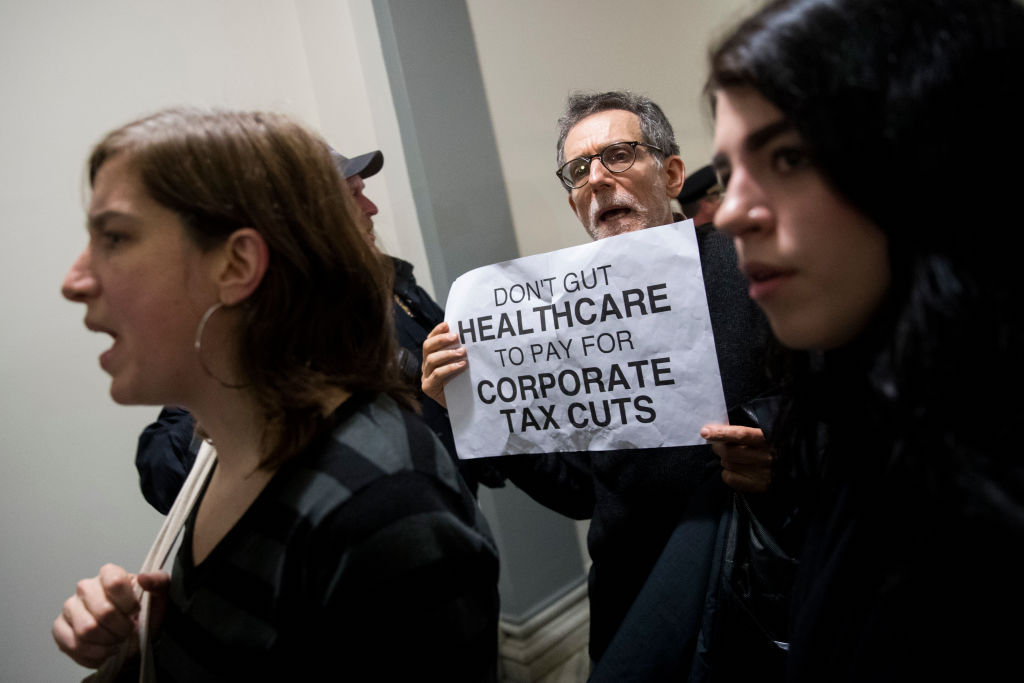Trump’s Economy, So Far
May 23, 2025
Erratic tariffs, egregious tax cuts, and eroded trust.
The Roosevelt Rundown features our top stories of the week.

Activists on Capitol Hill rally against the Tax Cuts and Jobs Act in December 2017. (Drew Angerer/Getty Images)
Tax Relief for the Rich, Economic Chaos for the Rest of Us
The Trump administration’s economic policies favor the ultra-wealthy while putting workers and the broader economy in a precarious position. Just this week, the House passed its budget bill that would cut taxes for the rich while slashing support for basic needs and health insurance for low-income families. The president’s much-discussed trade policy continues to breed uncertainty, raise costs, and stifle investment, but as its unpredictable rollout has shown, despite the harms, even haphazard tariffs can be undone. But, as Roosevelt Institute Principal Economist Michael Madowitz warns in Barron’s this week, “Other policy mistakes this administration is making aren’t reversible and are undermining America’s unique competitive advantages in ways that will cost middle-class Americans for years to come.”
Trump’s other, long-lasting blows to the economy—like cutting funds for public research, attacking higher education, and restricting immigration—are hurting investors’ willingness to invest in the US, Madowitz argues. The downstream effects range from increasing mortgage rates and construction costs to declining housing affordability and access.
“The credibility that the US is a safe, stable place to do business is eroding,” Madowitz writes. “Unlike tariffs, these challenges are rooted in sincere changes in how the US economy is perceived. [That] trust . . . can take years to restore.”
The indiscriminate tariffs are already leading many companies to increase their prices. Roosevelt President and CEO Elizabeth Wilkins spoke to the New York Times about how, while tariffs do increase costs, corporations can take advantage of economic uncertainty and anxiety around potential inflation to gouge prices, especially in uncompetitive markets.
“The basic idea that companies have more pricing power than we believe that they did is something we should interrogate,” Wilkins told the Times.
As workers face threats to their well-being, the superrich are doing fine. That’s because “Donald Trump is quickly turning the United States into the greatest tax haven in history,” Roosevelt Chief Economist Joseph Stiglitz argues. The administration’s warming relations with the crypto industry, along with its gutting of the Internal Revenue Service, have shown that “the agenda is clear: not just lower tax rates for the rich, but weaker enforcement.”
What We’re Talking About

What We’re Reading
- On the Nippon-US Steel deal: The Japan steelmaker committed to invest $11 billion in US Steel by 2028, four times as much as its initial $2.7 billion pledge, the Financial Times reported.
- “Multinational companies now understand that the formula for getting Trump’s favour is to float big numbers,” Roosevelt’s Todd N. Tucker told the FT. Still, he noted, the deal will have to be enforceable under the terms of the labor union’s contract.
- On crypto legislation: An industry-friendly stablecoin regulation bill passed the House this week, with progressive critics warning it could leave investors vulnerable, destabilize financial systems, and open the door to corrupt profiteering by the Trump administration.
- On the home insurance crisis: Nearly 19,000 homes could face foreclosure this year due to climate-related risks, according to an estimate from risk-modeling firm First Street. The first issue of Roosevelt’s Fed Lit Substack newsletter covered this fundamental threat to housing markets.